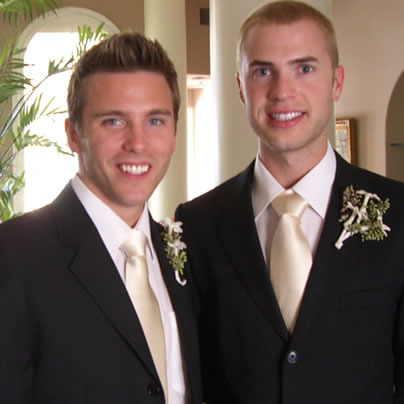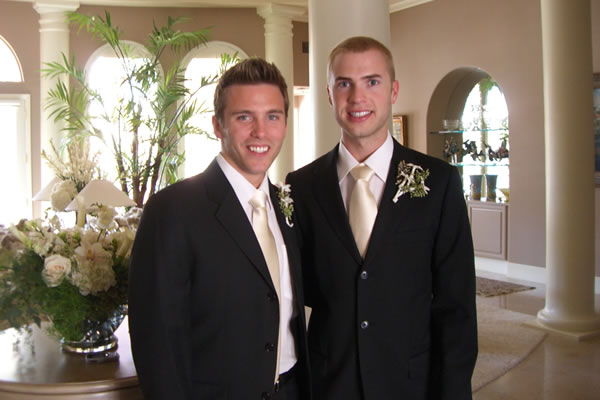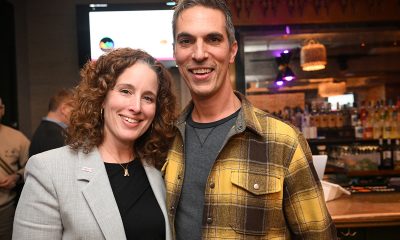Arts & Entertainment
Calendar: Nov. 8
Parties, concerts, exhibits and more for the week ahead


Shane and Tom, the central figures in the film ‘Bridegroom,’ which will be screened Thursday at HRC. (Still courtesy Mozark Productions)
Friday, Nov. 8
Town (2009 8th St., N.W.) hosts Bear Happy Hour tonight from 6-11 p.m. There is no cover charge and admission is limited to guests 21 and over. For more information, visit towndc.com.
Green Lantern (1335 Green Ct., N.W.) hosts “JOCK” tonight from 9 p.m.-3 a.m. with DJ Jake Marx. Dress code is sports gear or just a jock. Dress code strictly enforced. There is an open bar from 9-10 p.m. Cover is $10. For details, visit greenlantendc.com.
Nellie’s Sports Bar (900 U St., N.W.) hosts “Kickoff” featuring DJ Matt Bailer tonight from 10 p.m.-closing. For more information, visit nelliessportsbar.com.
Bachelor’s Mill (1104 8th St., S.E.) holds a happy hour from 5-7:30 p.m. tonight with all drinks half price. Hip music begins at 11 p.m. Enjoy pool, video games, and cards. Admission is $5 after 9 p.m. Must be 21 and over. For more details, visit bachelorsmill.com.
Saturday, Nov. 9
Singer and actress Melissa Errico performs “A Passion for Broadway” with Broadway songs focusing on Stephen Sondheim and more, at The Barns at Wolf Trap (1635 Trap Rd., Vienna, Va.) tonight at 7:30 p.m. Tickets range from $40-$42. For details, visit wolftrap.org.
Stonewall Kickball hosts its “Fall 2013 All Stars Game” at Stead Park (1625 P St.,) today from 2-4 p.m. Cobalt and JR.’s division will be playing. For details, email [email protected].
Team D.C. presents its fall casino night at Buffalo Billards (1330 19th St., N.W.) tonight from 8 p.m.-midnight in support of local LGBT sports clubs. Play poker, blackjack and craps to win raffle prizes. The LGBT sports teams will be running the tables including D.C. Aquatics, D.C. Strokes Rowing Club, Capitol Area Rainbowlers and more. There is no cover charge. $10 is worth $100 in chips and $20 is worth $250 in chips. For more details, visit teamdc.org.
Sunday, Nov. 10
Temple Emanuel (10101 Connecticut Ave., Kensington, Md.) hosts its “Brotherhood Brunch with Guest Speaker Professor Ethan Hutt” this morning at 9:15 a.m. Hutt is an assistant professor at University of Maryland who recently published an article on educational malpractice. Admission is $7 for non-Brotherhood members and $5 for Brotherhood members. RSVP at [email protected] or call 301-942-2000.
Burgundy Crescent, a gay volunteer organization, volunteers for D.C. Central Kitchen (425 2nd St., N.W.) today from 9 a.m.-noon. Volunteers will cook alongside chefs who are graduates of D.C. Central Kitchen’s job training program. To volunteer, RSVP at [email protected]. For more information, visit burgundycrescent.org.
Arlington Philharmonic presents a free concert for its season opener featuring soloist Jeffrey Work, principal trumpet of the Oregon Symphony, today at 3 p.m. at the Washington-Lee Auditorium (1301 N. Stafford St., Arlington, Va.). For details, visit arlingtonphilharmonic.org.
The Choral Arts Society of Washington presents the East Coast premiere of Steven Stucky’s “Take Him, Earth,” an orchestral commemoration of the 50th anniversary of Kennedy’s assassination, today at 4 p.m. at the Kennedy Center (2700 F St., N.W.). Tickets range from $23-$68. For more details, visit kennedy-center.org.
The D.C. Center celebrates the life of Joe Rio from the Center Careers program at DC9 (1940 9th St., N.W.) today from 2-4 p.m. Rio assisted individuals to find jobs and careers, facilitated weekly “Job Club” and “Masterminds” groups at the D.C. Center and the Spanish language Career Development at Casa Ruby for the D.C. Center. To RSVP, email larryd2156. For more details, visit thedccenter.org.
Church of the Holy City (1611 16th Street, N.W.) hosts its “Music with the Angels” concert series today at 3:30 p.m. featuring cellist Natalie Spehar and violinist Zachary Wu performing works by Fiorillo, Ravel and more. Tickets are $10 for adults; $5 for children and seniors. Visit churchoftheholycitydc.org for details.
Monday, Nov. 11
The D.C. Center (1318 U St., N.W.) hosts coffee drop-in hours this morning from 10 a.m.-noon for the senior LGBT community. Older LGBT adults can come and enjoy complimentary coffee and conversation with other community members. For more information, visit thedccenter.org
Us Helping Us (3636 Georgia Ave., N.W.) holds a support group for gay black men to discuss topics that affect them today, share perspectives and have meaningful conversations. For details, visit uhupil.org.
Tuesday, Nov. 12
Us Helping Us is having a town hall meeting tonight at 7 p.m. to discuss implementation of the Affordable Care Act at its headquarters (3636 Georgia Ave., N.W.). The meeting will discuss the impact the act will have on the LGBT community and provide an overview of the D.C. Health Exchange. On-site enrollment will also be offered. The event is free and open to the public. Visit uhupil.org for details.
D.C. Bi Women hosts its monthly meeting in the upstairs room of Dupont Italian Kitchen (1637 17th St., N.W.) from 7-9 p.m. tonight. For more details, visit thedccenter.org.
SMYAL (410 7th St., S.E.) hosts a “Rap Group” today from 5-6:30 p.m. Discuss stressful issues like school, bullying, getting into college or finding a job in this support group. For more details, visit smyal.org.
Wednesday, Nov. 13
Big Gay Book Group meets tonight at 1155 F St., N.W. Suite 200 at 7 p.m. to discuss “Mary Ann in Autumn” by Armistead Maupin, a story about Mary Ann Singleton’s homecoming to San Francisco after spending 20 years pursuing a television career in New York City. For details, email [email protected].
The Lambda Bridge Club meets tonight at 7:30 p.m. at the Dignity Center (721 8th St., S.E.) for duplicate bridge. No reservations required and new comers welcome. If you need a partner, call 703-407-6540.
SMYAL (410 7th St., S.E.) provides free and confidential HIV testing drop-in hours today from 3-5 p.m. For more information, visit smyal.org.
Thursday, Nov. 14
Human Rights Campaign hosts a free screening of the documentary “Bridegroom” this evening at 6 p.m. at its headquarters (1640 Rhode Island Ave., N.W.) as part of its “Equality Talks” speaker series. Shane Bitney Crone, the film’s producer, will speak. “Bridegroom,” directed by Linda Bloodworth Thomason, tells the story of two men in a committed relationship and what happens after an accident cuts short their lives together. The film explores how a partner can be legally shut out without having proper protections in place. Doors open at 6 p.m. for the event. View the trailer at bridegroommovie.com. Details on the event are at hrc.org/bridegroom.
Burgundy Crescent, a gay volunteer organization, volunteers for Food and Friends (219 Riggs Rd., N.E.) tonight from 6-8 p.m. Volunteers will chop vegetables and pack groceries. To volunteer, email [email protected]. For more details, visit burgundycrescent.org.
Rude Boi Entertainment hosts “Tempted 2 Touch,” a ladies dance party, at the Fab Lounge (2022 Florida Ave., N.W.) tonight. Doors open at 10 p.m. Drink specials $5 and vodka shots $3 all night. No cover charge. Admission limited to guests 21 and over. For more details, visit rudeboientertainment.wordpress.com.
The D.C. Center and Professionals in the City host speed dating for women in their 20s and 30s at Finn and Porter located inside the Embassy Suites Hotel (900 10th St., N.W.) tonight from 7-9 p.m. Dating is approximately one hour. After enjoy a mixer with fellow speed daters. Cash bar. Check in is at 7 p.m. and dating begins at 7:20 p.m. Complimentary valet parking offered to anyone who purchases two drinks or other items from the bar or restaurant. Cost is $30. For details, visit thedccenter.org.
“RuPaul’s Drag Race” contestant Pandora Boxx performs her standup comedy show at Cobalt (1639 R St., N.W.) tonight at 9 p.m. Doors open at 8:30 p.m. Admission is $5. For more information, visit cobaltdc.com.
Theater
Magic is happening for Round House’s out stage manager
Carrie Edick talks long hours, intricacies of ‘Nothing Up My Sleeve’

‘Nothing Up My Sleeve’
Through March 15
Round House Theatre
4545 East-West Highway
Bethesda, Md. 20814
Tickets start at $50
Roundhousetheatre.org
Magic is happening for out stage manager Carrie Edick.
Working on Round House Theatre’s production of “Nothing Up My Sleeve,” Edick quickly learned the ways of magicians, their tricks, and all about the code of honor among those who are privy to their secrets.
The trick-filled, one-man show starring master illusionist Dendy and staged by celebrated director Aaron Posner, is part exciting magic act and part deeply personal journey. The new work promises “captivating storytelling, audience interaction, jaw-dropping tricks, and mind-bending surprises.”
Early in rehearsals, there was talk of signing a non-disclosure agreement (NDA) for production assistants. It didn’t happen, and it wasn’t necessary, explains Edick, 26. “By not having an NDA, Dendy shows a lot of trust in us, and that makes me want to keep the secrets even more.
“Magic is Dendy’s livelihood. He’s sharing a lot and trusting a lot; in return we do the best we can to support him and a large part of that includes keeping his secrets.”
As a production assistant (think assistant stage manager), Edick strives to make things move as smoothly as possible. While she acknowledges perfection is impossible and theater is about storytelling, her pursuit of exactness involves countless checklists and triple checks, again and again. Six day weeks and long hours are common. Stage managers are the first to arrive and last to leave.
This season has been a lot about learning, adds Edick. With “The Inheritance” at Round House (a 22-week long contract), she learned how to do a show in rep which meant changing from Part One to Part Two very quickly; “In Clay” at Signature Theatre introduced her to pottery; and now with “Nothing Up My Sleeve,” she’s undergoing a crash course in magic.
She compares her career to a never-ending education: “Stage managers possess a broad skillset and that makes us that much more malleable and ready to attack the next project. With some productions it hurts my heart a little bit to let it go, but usually I’m ready for something new.”
For Edick, theater is community. (Growing up in Maryland, she was a shy kid whose parents signed her up for theater classes.) Now that community is the DMV theater scene and she considers Round House her artistic home. It’s where she works in different capacities, and it’s the venue in which she and actor/playwright Olivia Luzquinos chose to be married in 2024.
Edick came out in middle school around the time of her bat mitzvah. It’s also around the same time she began stage managing. Throughout high school she was the resident stage manager for student productions, and also successfully participated in county and statewide stage management competitions which led to a scholarship at the University of Maryland, Baltimore County (UMBC) where she focused on technical theater studies.
Edick has always been clear about what she wants. At an early age she mapped out a theater trajectory. Her first professional gig was “Tuesdays with Morrie” at Theatre J in 2021. She’s worked consistently ever since.
Stage managing pays the bills but her resume also includes directing and intimacy choreography (a creative and technical process for creating physical and emotional intimacy on stage). She names Pulitzer Prize winning lesbian playwright Paula Vogel among her favorite artists, and places intimacy choreographing Vogel’s “How I learned to Drive” high on the artistic bucket list.
“To me that play is heightened art that has to do with a lot of triggering content that can be made very beautiful while being built to make you feel uncomfortable; it’s what I love about theater.”
For now, “Nothing Up My Sleeve” keeps Edick more than busy: “For one magic trick, we have to set up 100 needles.”
Ultimately, she says “For stage managers, the show should stay the same each night. What changes are audiences and the energy they bring.”

Friday, February 13
Center Aging Monthly Luncheon With Yoga will be at noon at the DC Center for the LGBT Community. Email Mac at [email protected] if you require ASL interpreter assistance, have any dietary restrictions, or questions about this event.
Go Gay DC will host “LGBTQ+ Community Happy Hour Meetup” at 7 p.m. at Freddie’s Beach Bar and Restaurant. This is a chance to relax, make new friends, and enjoy happy hour specials at this classic retro venue. Attendance is free and more details are available on Eventbrite.
Women in their Twenties and Thirties will be at 7 p.m. on Zoom. This is a social discussion group for queer women in the D.C. area. For more details, visit the group on Facebook.
Saturday, February 14
Go Gay DC will host “LGBTQ+ Community Brunch” at 11 a.m. at Freddie’s Beach Bar & Restaurant. This fun weekly event brings the DMV area LGBTQ community, including allies, together for delicious food and conversation. Attendance is free and more details are available on Eventbrite.
The DC Center for the LGBT Community will host a screening of “Love and Pride” at 1:30 p.m. This event is a joy-filled global streaming celebration honoring queer courage, Pride, and the power of love. It’s a bold celebration of courage and community — a fearless reminder of what we’ve overcome, how love is what makes us unstoppable, and how we have always turned fear into fierce. For more details, visit the Center’s website.
Sunday, February 15
LGBTQ+ Community Coffee and Conversation will be at 12 p.m. at As You Are. This event is for people looking to make more friends and meaningful connections in the LGBTQ community. Attendance is free and more details are available on Eventbrite.
Monday, February 16
Queer Book Club will be at 7:00p.m. on Zoom. This month’s read is “Faebound” by Saara El-Arifi. For more details, visit the DC Center’s website.
“Center Aging: Monday Coffee Klatch” will be at 10 a.m. on Zoom. This is a social hour for older LGBTQ+ adults. Guests are encouraged to bring a beverage of choice. For more information, contact Adam ([email protected]).
Tuesday, February 17
Center Bi+ Roundtable will be at 7 p.m. on Zoom. This is an opportunity for people to gather in order to discuss issues related to bisexuality or as Bi individuals in a private setting.Visit Facebook or Meetup for more information.
Wednesday, February 18
Job Club will be at 6 p.m. on Zoom upon request. This is a weekly job support program to help job entrants and seekers, including the long-term unemployed, improve self-confidence, motivation, resilience and productivity for effective job searches and networking — allowing participants to move away from being merely “applicants” toward being “candidates.” For more information, email [email protected] or visit thedccenter.org/careers.
Thursday, February 19
The DC Center’s Fresh Produce Program will be held all day at the DC Center for the LGBT Community. To be fair with who is receiving boxes, the program is moving to a lottery system. People will be informed on Wednesday at 5 p.m. if they are picked to receive a produce box. No proof of residency or income is required. For more information, email [email protected] or call 202-682-2245.
Virtual Yoga Class will be at 7 p.m. on Zoom. This free weekly class is a combination of yoga, breath work and meditation that allows LGBTQ+ community members to continue their healing journey with somatic and mindfulness practices. For more details, visit the DC Center’s website.
Movies
As Oscars approach, it’s time to embrace ‘KPop Demon Hunters’
If you’ve resisted it, now’s the time to give in

If you’re one of the 500 million people who made “KPop Demon Hunters” into the most-watched original Netflix title in the streaming platform’s history, this article isn’t for you.
If, however, you’re one of the millions who skipped the party when the Maggie Kang-created animated musical fantasy debuted last summer, you might be wondering why this particular piece of pop youth culture is riding high in an awards season that seems all but certain to end with it winning an Oscar or two; and if that’s the case, by all means, keep reading.
We get it. If you’re not a young teen (or you don’t have one), it might have escaped your radar. If you don’t like KPop, or the fantasy genre just isn’t your thing, there would be no reason for that title to pique your interest – on the contrary, you would assume it’s just a movie that wasn’t made for you and leave it at that.
It’s now more than half a year later, though, and “KPop Demon Hunters” has yet to fade into pop culture memory, in spite of the “new, now, next” pace with which our social media world keeps scrolling by. It might feel like there’s been a resurgence of interest since the film’s ongoing sweep of major awards in the Best Animated Film and Best Song categories has led it close to Oscar gold, but in reality, the interest never really flagged. Millions of fans were still streaming the soundtrack album on a loop, all along.
It wasn’t just the music that they embraced, though that was definitely a big factor – after all, the film’s signature song, “Golden,” has now landed a Grammy to display alongside all of its film industry accolades. But Kang’s anime-influenced urban fantasy taps into something more substantial than the catchiness of its songs; through the filter of her experience as a South Korean immigrant growing up in Canada, she draws on the traditions and mythology of her native culture while blending them seamlessly into an infectiously contemporary and decidedly Western-flavored “girl power” adventure about an internationally popular KPop girl band – Huntrix, made up of lead singer Rumi (Arden Cho), lead dancer Mira (May Hong), and rapper/lyricist Zoey (Ji-young Yoo) – who also happen to be warriors, charged with protecting humankind from the influence of Gwi-Ma (Lee Byung-hun), king of the demon world, which is kept from infiltrating our own by the power of their music and their voices. Oh, and also by their ability to kick demon ass.
In an effort to defeat the girls at their own game, Gwi-Ma sends a demonic boy band led by handsome human-turned-demon Jinu (Ahn Hyo-seop) to steal their fans, creating a rivalry that (naturally) becomes complicated by the spark that ignites between Rumi and Jinu, and that forces Rumi to confront the half-demon heritage she has managed to keep secret – even from her bandmates – but now threatens to destroy Huntrix from within, just when their powers are needed most.
It’s a bubble-gum flavored fever-dream of an experience, for the most part, which never takes itself too seriously. Loaded with outrageous kid-friendly humor and pop culture parody, it might almost feel as if it were making fun of itself if not for the obvious sincerity it brings to its celebration of all things K-Pop, and the tangible weight it brings along for the ride through its central conflict – which is ultimately not between the human and demon worlds but between the long-held prejudices of the past and the promise of a future without them.
That’s the hook that has given “KPop Demon Hunters” such a wide-ranging and diverse collection of fans, and that makes it feel like a well-timed message to the real world of the here and now. In her struggle to come to terms with her part-demon nature – or rather, the shame and stigma she feels because of it – Rumi becomes a point of connection for any viewer who has known what it’s like to hide their full selves or risk judgment (or worse) from a world that has been taught to hate them for their differences, and maybe what it’s like to be taught to hate themselves for their differences, too.
For obvious reasons, that focus adds a strong layer of personal relevance for queer audiences; indeed, Kane has said she wanted the film to mirror a “coming out” story, drawing on parallels not just with the LGBTQ community, but with people marginalized through race, gender, trauma, neurodivergence – anything that can lead people to feel like an “other” through cultural prejudices and force them to deal with the pressure of hiding an essential part of their identity in order to blend in with the “normal” community. It plays like a direct message to all who have felt “demonized” for something that’s part of their nature, something over which they have no choice and no control, and it positions that deeply personal struggle as the key to saving the world.
Of course, “KPop Demon Hunters” doesn’t lean so hard into its pro-diversity messaging that it skimps on the action, fun, and fantasy that is always going to be the real reason for experiencing a genre film where action, fun, and fantasy are the whole point in the first place. You don’t have to feel like an “other” to enjoy the ride, or even to get the message – indeed, while it’s nice to feel “seen,” it’s arguably much more satisfying to know that the rest of the world might be learning how to “see” you, too. By the time it reaches its fittingly epic finale, Kane’s movie (which she co-directed with Chris Appelhans, and co-wrote with Appelhans, Danya Jimenez, and Hannah McMechan) has firmly made its point that, in a community threatened by hatred over perceived differences, the real enemy is our hate – NOT our differences.
Sure, there are plenty of other reasons to enjoy it. Visually, it’s an imaginative treat, building an immersive world that overlays an ancient mythic cosmology onto a recognizably contemporary setting to create a kind of whimsical “metaverse” that feels almost more real than reality (the hallmark of great mythmaking, really); yet it still allows for “Looney Toons” style cartoon slapstick, intricately choreographed dance and battle sequences that defy the laws of physics, slick satirical commentary on the juggernaut of pop music and the publicity machine that drives it, not to mention plenty of glittery K-Pop earworms that will take you back to the thrill of being a hormonal 13-year-old on a sugar high; but what makes it stand out above so many similar generic offerings is its unapologetic celebration of the idea that our strength is in our differences, and its open invitation to shed the shame and bring your differences into the light.
So, yes, you might think “KPop Demon Hunters” would be a movie that’s exactly what it sounds like it will be – and you’d be right – but it’s also much, much more. If you’ve resisted it, now’s the time to give in.
At the very least, it will give you something else to root for on Oscar night.




















